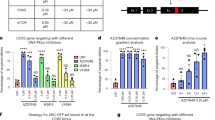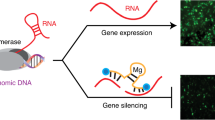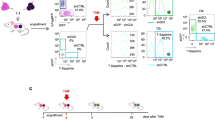Abstract
Efficiency and specificity are two key attributes of anti-cancer drugs including genetic therapeutic agents. We suggest a way to improve specificity of gene therapy drugs based on the ability of 3′-untranslated regions (UTR) of some mRNAs selectively stabilize transcripts only during cell division. The mRNAs of genes encoding DNA methyltransferase I (DNMT1) and topoisomerase IIα (TOP2A) are among such transcripts. When inserted into genetic constructs designed to produce therapeutic protein in tumor cells, such 3′-UTR would lead to diminished effect of therapeutic protein on normal cells, which are characterized by low or absent proliferative activity. However, when included in gene expression cassette, these 3′-UTR might result in decreased transgene expression, thus, overweighting the advantage of increased specificity of expression. We showed that DNMT1 and to the lesser extent TOP2A 3′-UTR do not alter significantly therapeutic transgene expression level in tumor cells, thus, confirming the functionality of the proposed approach.
This is a preview of subscription content, access via your institution
Access options
Subscribe to this journal
Receive 12 print issues and online access
$259.00 per year
only $21.58 per issue
Buy this article
- Purchase on Springer Link
- Instant access to full article PDF
Prices may be subject to local taxes which are calculated during checkout

Similar content being viewed by others
References
Kyo S, Takakura M, Fujiwara T, Inoue M . Understanding and exploiting hTERT promoter regulation for diagnosis and treatment of human cancers. Cancer Sci 2008; 99: 1528–1538.
Gu J, Fang B . Telomerase promoter-driven cancer gene therapy. Cancer Biol Ther 2008; 2: S64–S70.
Majumdar AS, Hughes DE, Lichtsteiner SP, Wang Z, Lebkowski JS, Vasserot AP . The telomerase reverse transcriptase promoter drives efficacious tumor suicide gene therapy while preventing hepatotoxicity encountered with constitutive promoters. Gene Ther 2001; 8: 568–578.
Editorial. Gene therapy deserves a fresh chance. Nature 2009; 461: 1173.
Detich N, Ramchandani S, Szyf M . A conserved 3′-untranslated element mediates growth regulation of DNA methyltransferase 1 and inhibits its transforming activity. J Biol Chem 2001; 276: 24881–24890.
Goswami PC, Roti Roti JL, Hunt CR . The cell cycle-coupled expression of Topoisomerase II alpha during S phase is regulated by mRNA stability and is disrupted by heat shock or ionizing radiation. Mol Cell Biol 1996; 16: 1500–1508.
Goswami PC, Sheren J, Albee LD, Parsian A, Sim JE, Ridnour LA et al. Cell cycle-coupled variation in Topoisomerase II alpha mRNA is regulated by the 3′-untranslated region. Possible role of redox-sensitive protein binding in mRNA accumulation. J Biol Chem 2000; 275: 38384–38392.
Fischer BM, Zheng S, Fan R, Voynow JA . Neutrophil elastase inhibition of cell cycle progression in airway epithelial cells in vitro is mediated by p27kip1. Am J Physiol Lung Cell Mol Physiol 2007; 293: L762–L768.
Takeda T, Inaba H, Yamazaki M, Kyo S, Miyamoto T, Suzuki S et al. Tumor-specific gene therapy for undifferentiated thyroid carcinoma utilizing the telomerase reverse transcriptase promoter. J Clin Endocrinol Metab 2003; 88: 3531–3538.
Wirth T, Zender L, Schulte B, Mundt B, Plentz R, Rudolph KL et al. A telomerase-dependent conditionally replicating adenovirus for selective treatment of cancer. Cancer Res 2003; 63: 3181–3188.
Acknowledgements
This work was supported by the Russian Federal Agency for Science and Innovation (contract #02.522.11.2005) and Molecular and Cell Biology Program of Russian Academy of Sciences.
Author information
Authors and Affiliations
Corresponding author
Ethics declarations
Competing interests
The described principle to increase specificity of transgene expression in proliferating cells and the described embodiment of this principle is a patent pending in Russian Federation (filed by the Institute of Molecular Genetics, Russian Academy of Sciences).
Additional information
Supplementary Information accompanies the paper on Cancer Gene Therapy website
Supplementary information
Rights and permissions
About this article
Cite this article
Shepelev, M., Korobko, E., Georgiev, G. et al. Application of mRNA regulatory regions to improve tumor specificity of transgene expression. Cancer Gene Ther 18, 682–684 (2011). https://doi.org/10.1038/cgt.2011.33
Received:
Revised:
Accepted:
Published:
Issue Date:
DOI: https://doi.org/10.1038/cgt.2011.33



